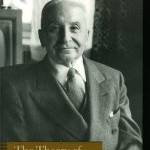 An instructive trio of essays by economists at Cato Unbound about Austrian economics’ reputation — especially Mises’s praxeological version — for being strongly a priori rationalist: Is Austrian economics anti-empiricist?
An instructive trio of essays by economists at Cato Unbound about Austrian economics’ reputation — especially Mises’s praxeological version — for being strongly a priori rationalist: Is Austrian economics anti-empiricist?
Steve Horwitz says no.
Bryan Caplan says yes.
George Selgin also says yes.
To Selgin’s series of quotations from Mises, I’d add this one from Human Action:
“Praxeology is a theoretical and systematic, not a historical, science. Its scope is human action as such, irrespective of all environmental, accidental, and individual circumstances of the concrete acts.  Its cognition is purely formal and general without reference to the material content and the particular features of the actual case. It aims at knowledge valid for all instances in which the conditions exactly correspond to those implied in its assumptions and inferences. Its statements and propositions are not derived from experience. They are, like those of logic and mathematics, a priori. They are not subject to verification or falsification on the ground of experience and facts.” (Human Action, 2.1.)
Its cognition is purely formal and general without reference to the material content and the particular features of the actual case. It aims at knowledge valid for all instances in which the conditions exactly correspond to those implied in its assumptions and inferences. Its statements and propositions are not derived from experience. They are, like those of logic and mathematics, a priori. They are not subject to verification or falsification on the ground of experience and facts.” (Human Action, 2.1.)
My view is that George Selgin most accurately states what Austrian economics has been — its roots and the tradition have been mostly anti-empirical. Steve Horwitz nicely states a healthy aspiration for Austrian economics — to move on from its anti-empirical roots — and shows that some Austrians are doing just that. And with helpful suggestions for realizing that aspiration, Bryan Caplan points to recent developments in economics and related fields that can and should be explored and integrated with Austrianism.
Let me add that on this epistemological issue, my fellow philosophers are most to blame for the methodological dilemmas the economists have been struggling with. In modern philosophy, the dichotomies between a priori and a posteriori, theoretical and practical, formal and material, deductive and inductive — all have been enormously destructive, especially in their post-Humean and post-Kantian variants. Most of the big name Austrians — Mises and Hayek included — absorbed that dichotomous philosophical framework and worked within it.
So there is ongoing epistemological work for Austrian-friendly philosophers like myself and philosophy-friendly Austrian economists. (My contribution to understanding how the dichotomies played out destructively is in my Explaining Postmodernism: Skepticism and Socialism from Rousseau to Foucault.)
It is possible that the epistemological dilemma can be resolved with the help of Barry Smith’s ” fallibilistic apriorism” which is practically the same as Popper’s ‘conjectural knowledge”.
http://www.the-rathouse.com/WritingsonMises/FallibleApriorism.html
(It helps to have a grip on Bartley’s non-justificationism as well.)